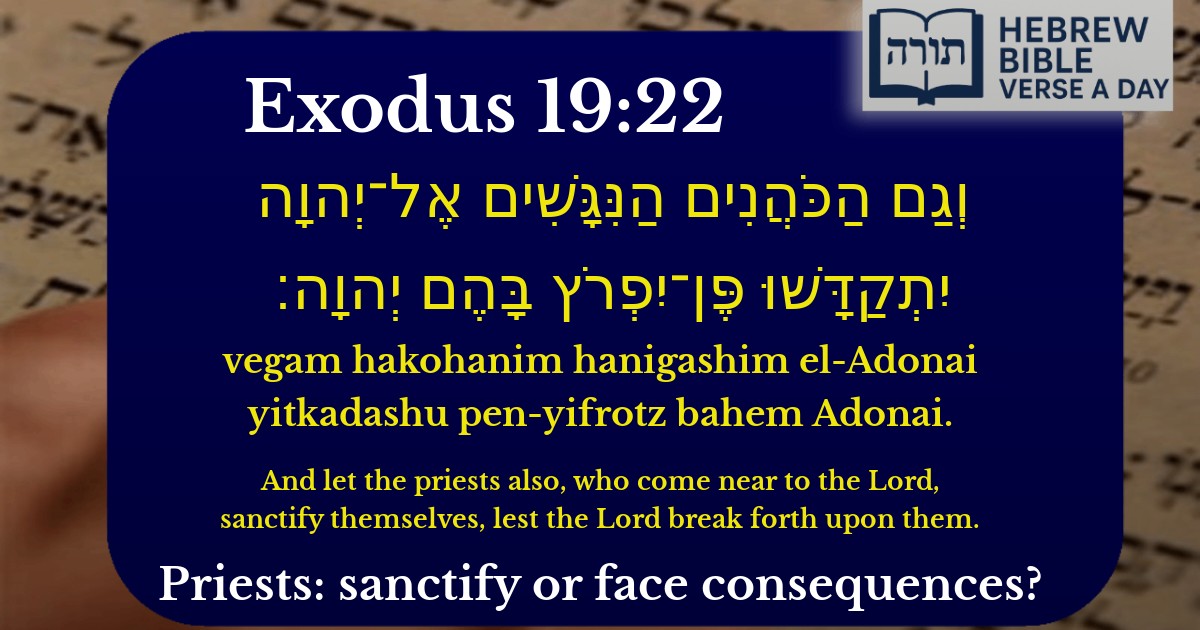Join Our Newsletter To Be Informed When New Videos Are Posted
Join the thousands of fellow Studends who rely on our videos to learn how to read the bible in Hebrew for free!
Hebrew Text
וְגַם הַכֹּהֲנִים הַנִּגָּשִׁים אֶל־יְהוָה יִתְקַדָּשׁוּ פֶּן־יִפְרֹץ בָּהֶם יְהוָה׃
English Translation
And let the priests also, who come near to the Lord, sanctify themselves, lest the Lord break forth upon them.
Transliteration
Vegam hakohanim hanigashim el-Adonai yitkadashu pen-yifrotz bahem Adonai.
Hebrew Leining Text
וְגַ֧ם הַכֹּהֲנִ֛ים הַנִּגָּשִׁ֥ים אֶל־יְהֹוָ֖ה יִתְקַדָּ֑שׁוּ פֶּן־יִפְרֹ֥ץ בָּהֶ֖ם יְהֹוָֽה׃
וְגַ֧ם הַכֹּהֲנִ֛ים הַנִּגָּשִׁ֥ים אֶל־יְהֹוָ֖ה יִתְקַדָּ֑שׁוּ פֶּן־יִפְרֹ֥ץ בָּהֶ֖ם יְהֹוָֽה׃
🎵 Listen to leining
Parasha Commentary
📚 Talmud Citations
This verse is quoted in the Talmud.
📖 Yoma 39a
The verse is referenced in the context of discussing the sanctity and precautions required for priests serving in the Temple, emphasizing the need for them to sanctify themselves properly to avoid divine punishment.
📖 Sanhedrin 83b
The verse is cited in a discussion about the severe consequences for priests who fail to maintain the required sanctity when approaching the divine service.


Context of the Verse
This verse appears in Shemot (Exodus) 19:22, during the preparations for Matan Torah (the Giving of the Torah) at Har Sinai. The Kohanim (priests) are instructed to sanctify themselves before approaching Hashem, lest they suffer severe consequences due to insufficient spiritual preparation.
Rashi's Explanation
Rashi explains that the term "הכהנים" (the priests) here refers not to the later Kohanim of the Mishkan and Beit HaMikdash, but to the Bechorim (firstborn sons), who served as priests before the sin of the Golden Calf. They needed extra sanctification because of their elevated role in the divine service at that time.
Rashi further notes that the warning "פן־יפרץ בהם ה'" (lest the Lord break forth upon them) implies that improper approach could lead to death, emphasizing the severity of coming close to the Divine Presence without proper preparation.
Rambam's Perspective
Rambam (Maimonides), in Hilchot Bi'at HaMikdash, discusses the concept of Kedushat HaKohanim (sanctity of the priests). He explains that approaching Hashem requires not only physical purity but also spiritual readiness. This verse serves as a foundational principle for the laws of priestly conduct in the Mishkan and Beit HaMikdash.
Midrashic Insights
Halachic Implications
The verse establishes a halachic principle that applies to all generations: those who serve in sacred roles must maintain a higher standard of holiness. This includes:
Chassidic Interpretation
The Baal Shem Tov teaches that this verse also applies metaphorically to every Jew's approach to prayer and Torah study. Just as the priests needed sanctification, we must prepare our hearts and minds before engaging in spiritual pursuits to connect properly with Hashem.